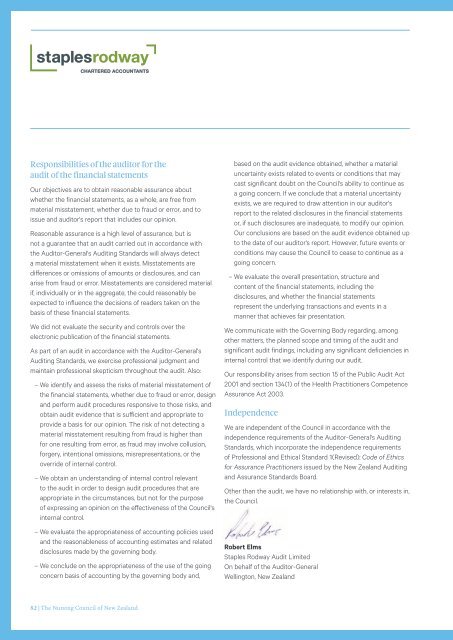NZNA_AnnualReport2017_280817_v10_small
You also want an ePaper? Increase the reach of your titles
YUMPU automatically turns print PDFs into web optimized ePapers that Google loves.
Responsibilities of the auditor for the<br />
audit of the financial statements<br />
Our objectives are to obtain reasonable assurance about<br />
whether the financial statements, as a whole, are free from<br />
material misstatement, whether due to fraud or error, and to<br />
issue and auditor's report that includes our opinion.<br />
Reasonable assurance is a high level of assurance, but is<br />
not a guarantee that an audit carried out in accordance with<br />
the Auditor-General's Auditing Standards will always detect<br />
a material misstatement when it exists. Misstatements are<br />
differences or omissions of amounts or disclosures, and can<br />
arise from fraud or error. Misstatements are considered material<br />
if, individually or in the aggregate, the could reasonably be<br />
expected to influence the decisions of readers taken on the<br />
basis of these financial statements.<br />
We did not evaluate the security and controls over the<br />
electronic publication of the financial statements.<br />
As part of an audit in accordance with the Auditor-General's<br />
Auditing Standards, we exercise professional judgment and<br />
maintain professional skepticism throughout the audit. Also:<br />
– We identify and assess the risks of material misstatement of<br />
the financial statements, whether due to fraud or error, design<br />
and perform audit procedures responsive to those risks, and<br />
obtain audit evidence that is sufficient and appropriate to<br />
provide a basis for our opinion. The risk of not detecting a<br />
material misstatement resulting from fraud is higher than<br />
for one resulting from error, as fraud may involve collusion,<br />
forgery, intentional omissions, misrepresentations, or the<br />
override of internal control.<br />
– We obtain an understanding of internal control relevant<br />
to the audit in order to design audit procedures that are<br />
appropriate in the circumstances, but not for the purpose<br />
of expressing an opinion on the effectiveness of the Council's<br />
internal control.<br />
– We evaluate the appropriateness of accounting policies used<br />
and the reasonableness of accounting estimates and related<br />
disclosures made by the governing body.<br />
– We conclude on the appropriateness of the use of the going<br />
concern basis of accounting by the governing body and,<br />
based on the audit evidence obtained, whether a material<br />
uncertainty exists related to events or conditions that may<br />
cast significant doubt on the Council's ability to continue as<br />
a going concern. If we conclude that a material uncertainty<br />
exists, we are required to draw attention in our auditor's<br />
report to the related disclosures in the financial statements<br />
or, if such disclosures are inadequate, to modify our opinion.<br />
Our conclusions are based on the audit evidence obtained up<br />
to the date of our auditor's report. However, future events or<br />
conditions may cause the Council to cease to continue as a<br />
going concern.<br />
– We evaluate the overall presentation, structure and<br />
content of the financial statements, including the<br />
disclosures, and whether the financial statements<br />
represent the underlying transactions and events in a<br />
manner that achieves fair presentation.<br />
We communicate with the Governing Body regarding, among<br />
other matters, the planned scope and timing of the audit and<br />
significant audit findings, including any significant deficiencies in<br />
internal control that we identify during our audit.<br />
Our responsibility arises from section 15 of the Public Audit Act<br />
2001 and section 134(1) of the Health Practitioners Competence<br />
Assurance Act 2003.<br />
Independence<br />
We are independent of the Council in accordance with the<br />
independence requirements of the Auditor-General's Auditing<br />
Standards, which incorporate the independence requirements<br />
of Professional and Ethical Standard 1(Revised): Code of Ethics<br />
for Assurance Practitioners issued by the New Zealand Auditing<br />
and Assurance Standards Board.<br />
Other than the audit, we have no relationship with, or interests in,<br />
the Council.<br />
Robert Elms<br />
Staples Rodway Audit Limited<br />
On behalf of the Auditor-General<br />
Wellington, New Zealand<br />
82 | The Nursing Council of New Zealand


